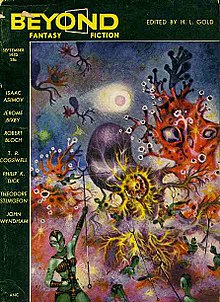
Damon Francis Knight was an American science fiction author, editor, and critic. He is the author of "To Serve Man", a 1950 short story adapted for The Twilight Zone. He was married to fellow writer Kate Wilhelm.

Eric Frank Russell was a British writer best known for his science fiction novels and short stories. Much of his work was first published in the United States, in John W. Campbell's Astounding Science Fiction and other pulp magazines. Russell also wrote horror fiction for Weird Tales and non-fiction articles on Fortean topics. Up to 1955 several of his stories were published under pseudonyms, at least Duncan H. Munro and Niall(e) Wilde.
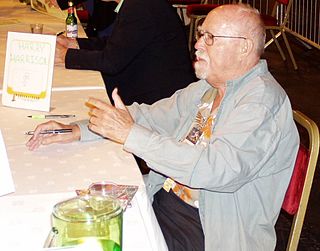
Harry Max Harrison was an American science fiction author, known mostly for his character The Stainless Steel Rat and for his novel Make Room! Make Room! (1966). The latter was the rough basis for the motion picture Soylent Green (1973). Long resident in both Ireland and the United Kingdom, Harrison was involved in the foundation of the Irish Science Fiction Association, and was, with Brian Aldiss, co-president of the Birmingham Science Fiction Group.

Drexel Jerome Lewis Bixby was an American short story writer and scriptwriter. He wrote the 1953 story "It's a Good Life", which was included in The Science Fiction Hall of Fame. It formed the basis of a 1961 episode of The Twilight Zone and was remade in Twilight Zone: The Movie (1983). He wrote four episodes for the Star Trek series: "Mirror, Mirror", "Day of the Dove", "Requiem for Methuselah", and "By Any Other Name". With Otto Klement, he co-wrote the story upon which the science fiction movie Fantastic Voyage (1966), the related television series, and the related Isaac Asimov novel were based. Bixby's final produced or published work so far was the screenplay for the 2007 science fiction film The Man from Earth.
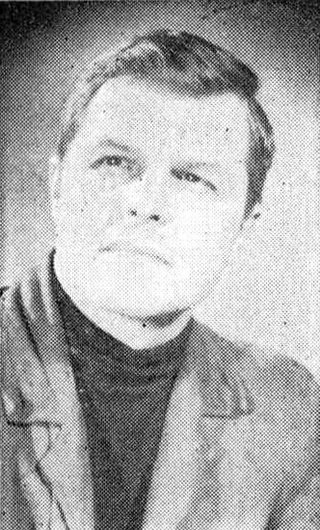
Theodore Rose Cogswell was an American science fiction author.
Alex Ebel was a science fiction and fantasy illustrator. Ebel painted the poster for the original Friday the 13th (1980), and an unused poster for Friday the 13th Part 2.
Theodore Lockard Thomas was an American chemical engineer and patent attorney who wrote more than 50 science fiction short stories, published between the early 1950s to the late 1970s. He also collaborated on two novels with Kate Wilhelm, as well as producing stories under the pseudonyms of Leonard Lockhard and Cogswell Thomas, and was nominated for the 1967 Nebula Award for Best Short Story and for a Hugo Award.

Beyond Fantasy Fiction was a US fantasy fiction magazine edited by H. L. Gold, with only ten issues published from 1953 to 1955. The last two issues carried the cover title of Beyond Fiction, but the publication's name for copyright purposes remained as before.
Paul Melko is an American science fiction writer whose work has appeared in Realms of Fantasy, Asimov's Science Fiction, Strange Horizons, and Live Without a Net.

Isaac Asimov Presents The Great SF Stories 15 (1953) is the fifteenth volume of Isaac Asimov Presents The Great SF Stories, which is a series of short story collections, edited by Isaac Asimov and Martin H. Greenberg, that attempts to include the best science fiction stories from the Golden Age of Science Fiction. The editors date the "Golden Age" as beginning in 1939 and ending in 1963. This volume was originally published by DAW books in December 1986.
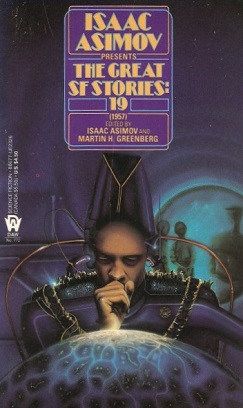
Isaac Asimov Presents The Great SF Stories 19 (1957) is the nineteenth volume of Isaac Asimov Presents The Great SF Stories, which is a series of short story collections, edited by Isaac Asimov and Martin H. Greenberg, which attempts to list the great science fiction stories from the Golden Age of Science Fiction. They date the Golden Age as beginning in 1939 and lasting until 1963. This volume was originally published by DAW books in February 1989.

Space Opera is a 1974 anthology of classic science fiction short stories edited by Brian Aldiss.

The 1990 Annual World's Best SF is an anthology of science fiction short stories edited by Donald A. Wollheim and Arthur W. Saha, the nineteenth volume in a series of nineteen. It was first published in paperback by DAW Books in July 1990, followed by a hardcover edition issued in August of the same year by the same publisher as a selection of the Science Fiction Book Club. For the hardcover edition the original cover art of Jim Burns was replaced by a new cover painting by Richard Powers.
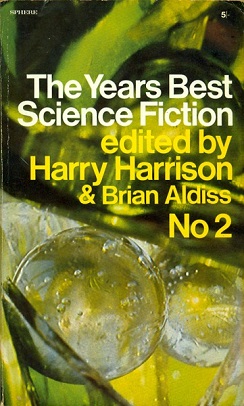
Best SF: 1968 is the second in the Best SF series edited by Harry Harrison and Brian W. Aldiss, first published in a British edition in January 1969 by Sphere Books. The first American edition was released later that year by Putnam, with a Berkley paperback following shortly thereafter. Severn House issued a British hardcover edition in 1977.
Gregory Norman Bossert is an American writer and filmmaker. He has won the World Fantasy Award and is a finalist for the Sturgeon Award. He lives in Marin County, California, and works at Industrial Light & Magic.

Wizards is an anthology of themed fantasy and science fiction short stories on the subject of wizards edited by Isaac Asimov, Martin H. Greenberg and Charles G. Waugh. The first volume in their Isaac Asimov's Magical Worlds of Fantasy series, it was first published in paperback by Signet/New American Library in October 1983. It was later gathered together with Witches, the second book in the series, into the omnibus hardcover collection Isaac Asimov's Magical Worlds of Fantasy: Witches & Wizards (1985).
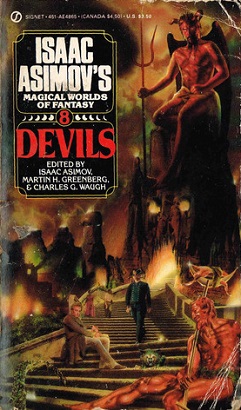
Devils is an anthology of themed fantasy and science fiction short stories on the subject of devils or demons edited by Isaac Asimov, Martin H. Greenberg and Charles G. Waugh as the eighth volume in their Isaac Asimov's Magical Worlds of Fantasy series. It was first published in paperback by Signet/New American Library in June 1987. The first British edition was issued in trade paperback by Robinson in 1989.

Curses is an anthology of themed fantasy and science fiction short stories on the subject of curses edited by Isaac Asimov, Martin H. Greenberg and Charles G. Waugh as the eleventh volume in their Isaac Asimov's Magical Worlds of Fantasy series. It was first published in paperback by Signet/New American Library in September 1989.

Space Mail is an anthology of science fiction short works edited by Isaac Asimov, Martin H. Greenberg, and Joseph Olander. It contains a series of short stories written in the form of letters, diary entries, or memoranda. The book is broken into three sections, each of which contains stories written in the type of documentation after which the section is named.
Suzanne Palmer is an American science fiction writer known for her novelette "The Secret Life of Bots", which won a Hugo Award in 2018. The story also won a WSFA Small Press Award and was a finalist for the Theodore Sturgeon Memorial Award.
